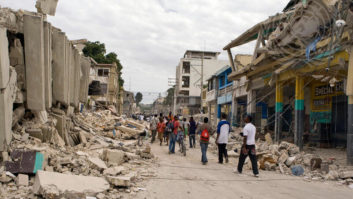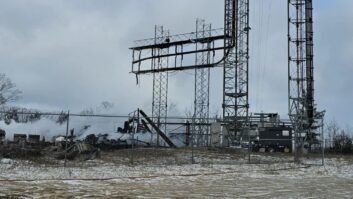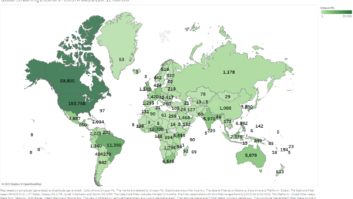
It’s nice to see the “Commando Solo” story getting wide news coverage. That’s the U.S. government’s plane that’s acting as a radio station over Haiti 10 hours a day.
The U.S. Air Force C-130 flies slowly over the island nation, trailing a 264-foot vertical wire as an AM antenna. At the end of the wire is a 500 pound weight to keep the wire vertical. Four other antennas on the wings and the fuselage transmit FM signals.
Voice of America news and information in Creole is transmitted by the plane. During programming breaks, PSAs are included, such as sanitation advice, what to do when encountering a dead body and a warning from the Haitian government not to attempt dangerous crossings in small boats to Florida.
To ensure the messages are being received, the Department of Defense has distributed thousands of solar-powered and wind-up radios in Haiti. Radio World readers may recall our cover story in 2002 about the Commando Solo operation.
The story reminds me of my time at VOA, writing and announcing the English news as part of a daily program broadcast in Creole and English to Haiti. After dictator Jean-Claude “Baby Doc” Duvalier was overthrown in 1986, VOA scrambled to increase the hours of programming transmitted to the island nation. At the time, the Russians were transmitting several hours each day of propaganda there, and the U.S. was trying to keep pace.
I worked alongside native Creole speakers from Haiti and France and learned how to frame the news from the viewpoint of a third-world nation. My colleagues were a mix of trained journalists, native speakers, as well as those with diplomatic ties to the island or those who had other federal government experience, like the U.S. Agency for International Development.
We assumed our listeners spoke Creole, with English as a second or third language, so we announced slowly and had to explain everything in each story. “Ronald Reagan, president of the United States of America,” etc. We changed the frequencies we broadcast on each day to try to outwit the Russians, who were jamming our broadcasts.
I’ll never forget talking to our freelancers on the phone and recording their news stories to be used in the program. Haiti was a dangerous place. More than once, I heard gunfire in the background as a freelancer asked for our help in getting to the U.S. and indeed, VOA did help a few come here.
Now, VOA says its Creole service broadcasts 10-1/2 hours on weekdays and 9-1/2 hours on weekends. It is available from the DoD airborne transmitter flying over Haiti, local Haitian affiliates and from U.S.-based transmitters.












